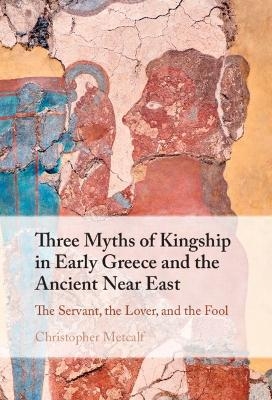
Three Myths of Kingship in Early Greece and the Ancient Near East
The Servant, the Lover, and the Fool
Seiten
2025
Cambridge University Press (Verlag)
978-1-009-48149-6 (ISBN)
Cambridge University Press (Verlag)
978-1-009-48149-6 (ISBN)
Starting from detailed reconsiderations of a wide range of ancient Near Eastern literary sources, the book proposes original and persuasive readings of familiar early Greek authors including Homer, Hesiod and Herodotus, and of other famous works such as the Hebrew Bible.
On the basis of recently discovered sources and original research, this book identifies and analyses three story-patterns associated with human kingship in early Greek and ancient Near Eastern myth. The first of these, the 'Myth of the Servant', was used to explain how an individual of non-royal lineage rose to power from obscure origins. The second myth, on the 'Goddess and the Herdsman', made the fundamental claim that the ruler engaged in a sexual relationship with a powerful female deity. Third, although kings are often central to the ancient literary evidence, the texts themselves were usually authored by others, such as poets, priests, prophets or scholars; like kings, these characters similarly tended to base their authority on their ability to articulate and enact the divine will. The stage was thus set for narratives of conflict between kings and other intermediaries of the gods.
On the basis of recently discovered sources and original research, this book identifies and analyses three story-patterns associated with human kingship in early Greek and ancient Near Eastern myth. The first of these, the 'Myth of the Servant', was used to explain how an individual of non-royal lineage rose to power from obscure origins. The second myth, on the 'Goddess and the Herdsman', made the fundamental claim that the ruler engaged in a sexual relationship with a powerful female deity. Third, although kings are often central to the ancient literary evidence, the texts themselves were usually authored by others, such as poets, priests, prophets or scholars; like kings, these characters similarly tended to base their authority on their ability to articulate and enact the divine will. The stage was thus set for narratives of conflict between kings and other intermediaries of the gods.
CHRISTOPHER METCALF is Associate Professor in Classical Languages and Literature at the University of Oxford and Tutorial Fellow in Classics at The Queen's College. His research focuses on the languages, literatures and religions of the eastern Mediterranean and the Near East. His publications include The Gods Rich in Praise: Early Greek and Mesopotamian Religious Poetry (2015) and Sumerian Literary Texts in the Schøyen Collection: Literary Sources on Old Babylonian Religion (2019).
1. The Myth of the Servant; 2. The Myth of the Goddess and the Herdsman; 3. King, Priest and Poet.
| Erscheinungsdatum | 14.12.2024 |
|---|---|
| Zusatzinfo | Worked examples or Exercises |
| Verlagsort | Cambridge |
| Sprache | englisch |
| Themenwelt | Literatur ► Klassiker / Moderne Klassiker |
| Geschichte ► Allgemeine Geschichte ► Vor- und Frühgeschichte | |
| Geschichte ► Allgemeine Geschichte ► Altertum / Antike | |
| Geisteswissenschaften ► Sprach- / Literaturwissenschaft ► Anglistik / Amerikanistik | |
| Geisteswissenschaften ► Sprach- / Literaturwissenschaft ► Literaturwissenschaft | |
| ISBN-10 | 1-009-48149-5 / 1009481495 |
| ISBN-13 | 978-1-009-48149-6 / 9781009481496 |
| Zustand | Neuware |
| Informationen gemäß Produktsicherheitsverordnung (GPSR) | |
| Haben Sie eine Frage zum Produkt? |
Mehr entdecken
aus dem Bereich
aus dem Bereich
Konzepte – Methoden – Theorien
Buch | Softcover (2024)
UTB (Verlag)
CHF 55,85
auf den Spuren der frühen Zivilisationen
Buch | Hardcover (2023)
C.H.Beck (Verlag)
CHF 27,95


